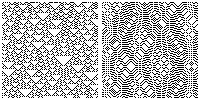

A second-order cellular automaton is a type of reversible cellular automaton (CA) invented by Edward Fredkin[1][2] where the state of a cell at time t depends not only on its neighborhood at time t − 1, but also on its state at time t − 2.[3]
- ^ Margolus, N. (1984), "Physics-like models of computation", Physica D, 10 (1–2): 81–95, Bibcode:1984PhyD...10...81M, doi:10.1016/0167-2789(84)90252-5. Reprinted in Wolfram, Stephen, ed. (1986), Theory and Applications of Cellular Automata, Advanced series on complex systems, vol. 1, World Scientific, pp. 232–246, Bibcode:1986taca.book.....W.
- ^ Cite error: The named reference
vichniacwas invoked but never defined (see the help page). - ^ Wolfram, Stephen (2002), A New Kind of Science, Wolfram Media, pp. 437–440, 452, ISBN 1-57955-008-8.